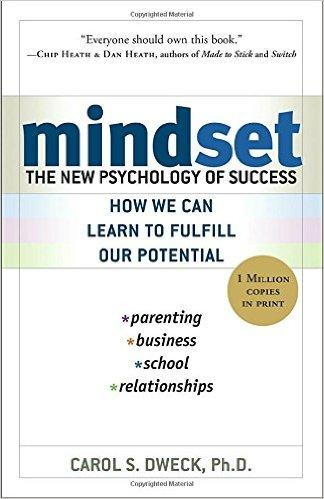We hope that you are having a wonderful holiday week! With the new year fast approaching, we thought that we'd discuss strategies for establishing a healthy mindset. Maybe you're thinking about setting a New Year's Resolution? Sadly, we know that statistically, most resolutions fail. Or perhaps you've taken the opposite approach and have decided that resolutions never work, so why bother this year? We'd rather discuss ways of encouraging a "growth mindset" as we move into 2017. So much of our sense of self, our successes or shortcomings in life are directly related to our mindset. People with a “set mindset” are stuck in the status quo, believing that their intelligence or circumstances cannot be changed, while those with a growth mindset believe that their intelligence increases as they embrace new challenges. Nurturing a growth mindset sounds pretty great to us.

Neuroscience research affirms that a growth mindset encourages the brain to develop throughout our lives, growing new neural connections in response to stimulation. If you cannot use a certain computer program or play a musical instrument today, regular practice will stimulate your brain to develop new connections. And after a series of attempts, suddenly one day it seems to all come together: You can do it. Stimulated by all that effort, your brain has formed new connections. Your mind is a powerful thing. The stories you tell yourself and the things you believe about yourself can either prevent change from happening or allow new skills to blossom.
The benefits of a growth mindset might seem obvious, but most of us are guilty of having a fixed mindset in certain situations. That can be dangerous because a fixed mindset can often prevent important skill development and growth, sabotaging health and happiness down the line.
For example, if you say, “I’m not a math person,” then that belief acts as an easy excuse to avoid practicing math. The fixed mindset protects you from failing in the short term, but in the long run it hinders your ability to learn, grow, and develop new skills. Meanwhile, someone with a growth mindset would be willing to try math problems even if they failed at first. They see failure and setbacks as an indication that they should continue developing their skills rather than a signal that indicates inadequacy. As a result, people who have a growth mindset are more likely to maximize their potential. They tend to learn from criticism rather than ignoring it, to overcome challenges rather than avoiding them, and to find inspiration in the success of others rather than feeling threatened.
Is Your Self-Talk Holding You Back?
Think about the statements that you regularly make about yourself. Do you tend to make statements with a negative connotation? “It’s hard for me to lose weight.” “I’m not good with numbers.” “I’m not a natural athlete.” “I’m not creative.” “I’m a procrastinator.” All of these statements are associated with a fixed mindset which will cause you to avoid experiences where you might feel like a failure. As a result, you don’t learn as much and it’s hard to get better.
Most people don’t realize it, but as we go about our daily lives, we are constantly thinking about and interpreting the situations we find ourselves in. It’s as though we have an internal voice inside our head that determines how we perceive every situation. Psychologists call this inner voice ‘self-talk‘, and it includes our conscious thoughts as well as our unconscious assumptions or beliefs.
Much of our self-talk is reasonable. For example, ‘I’d better do some preparation for that exam’, or ‘I’m really looking forward to that match’. However, some of our self-talk is negative, unrealistic or self-defeating. I'm sure that many of us can admit making statements such as: ‘I’m going to fail for sure’, or ‘I didn’t play well! I’m hopeless’.
Self-talk is often skewed towards the negative, and sometimes it’s just plain wrong. If you are experiencing depression, it is particularly likely that you interpret things negatively. That’s why it’s useful to keep an eye on the things you tell yourself, and challenge some of the negative aspects of your thinking.
You can test, challenge and change your self-talk. You can change some of the negative aspects of your thinking by challenging the irrational parts and replacing them with more reasonable thoughts. With practice, you can learn to notice your own negative self-talk as it happens, and consciously choose to think about the situation in a more realistic and helpful way.
How Do I Shift My Mindset?
Set small goals for yourself to start. These goals will grow and change, but setting small goals and attaining them is crucial when changing mindset. Let's say that your current self talk includes the statement: "It's hard for me to lose weight." Instead of stating that your goal is to lose weight, or to lose X number of pounds, rather set a goal of riding your bike for 20 minutes today. Then, you could set that same goal and ride your bike for 20 minutes the next day. Before too long, this small bike ride will grow into a habit. The idea here is that you should focus on the process, or on the schedule of regular bike rides. The new goal is to show up for yourself. Before long, your self talk will shift. You will add a new statement about your identity: "I am a cyclist." The weight loss will likely follow, and then you can change your self-talk statement to "I am conscious of my health."
You can prevent yourself from getting caught up in this negative thinking. Try this, in the morning focus on allowing your first thoughts to be positive and if a negative thought slips in, recognize it before it snowballs out of control. It’s normal to have negative thoughts every now and then, but once you realize what’s going on, focus on positive thoughts to drown out the negative. Eventually, your mood will follow and you’ll be able to get back on track. When you’re feeling lousy, ask yourself what bad feelings you are having and why. When you can identify the root of these negative feelings, it is easier to change them and make a conscious positive spin on the statement. When you change your thoughts, you change the way you feel, and only then can you change your life experience.
The bottom line is this: the power of your thoughts and beliefs are immense. They can lift you up and take you to the highest highs or drag you down to the lowest lows. The greatest leaders and most famous entertainers and athletes exercise healthy habits of thinking that springboard them into a fulfilling and prosperous life, and so can you!
Steps To Develop a Growth Mindset
Talk Back To Yourself
People with a fixed mindset will often go through a discussion with themselves in their heads. “Can I really do this? What happens if you screw up? Will everyone laugh?” Learn how to shut that voice up. Talk back and tell yourself that of course you can do it, and no one is going to laugh at you, that’s silly.
See The Glass As Half Full
Remember that in life, you always have two choices. When you fail at something you can see it as a failure or you can see it as an opportunity, it’s up to you. Try to find something positive in every setback.
Celebrate Small Wins
Understand that everything is a learning process, celebrate your small wins and remind yourself how much you’re learning. You’ll slowly train yourself to develop a mindset of always growing and learning.
Set Realistic Expectations
It’s important to set realistic expectations for yourself. Maybe the goals you’re setting aren’t the right ones or are way too ambitious, setting yourself up for failure. As you lock in some quick wins, you’ll continue to build up that confidence.
Exercise Your Mind
Doing exercise, yoga, or meditation is a great way to keep yourself calm and mentally strong. Being mentally strong will help you build up that confidence and see things clearer, helping you develop that growth mindset.
Growth and Change
As we've stated, a growth mindset is the belief that intelligence is dynamic and that the brain changes based on experiences. This theory of a growth mindset is supported by research into brain plasticity and has proven to be pivotal in helping students improve their academic achievement.
The best musicians practice every day. The best athletes practice every day. The best writers practice every day. They show up for themselves with the growth mindset to continue improving.
If you have kids, start helping them to find their growth mindset now. Encourage them to fail! By encouraging them to experience failures, they will realize that failing doesn't have to be scary or negative. It is an opportunity for growth. Also, celebrate their small wins! Encouraging both failures and wins will help your child to establish strong neural pathways at a young age.
Carol Dweck
Carol Dweck is the famed author of the book, Mindset. She is a professor of psychology at Stanford University, where she teaches courses in Personality and Social Development. She is considered to be one of the world's leading researchers in the field of motivation, and is a world-renowned speaker. We have included one of her talks below, which looks at the power of 'Not Yet.' Enjoy! |
|




